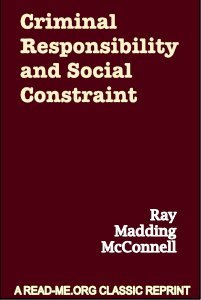By Ray Madding McConnell.
“Among the most expensive functions of government is that which is concerned with the detection, arrest, trial, and punishment of criminals. The expenditures in connection with police, courts, and prisons exceed in amount the outlay for the conservation and improvement of health, the necessities and conveniences of travel and intercourse, highways, parks, and playgrounds, and about equal the costs of education/ When any one begins to philosophize about the raison d^etre of this enormously expensive arrangement for dealing with crime and criminals, he naturally asks first for its purpose —What is the object of it all? What kind of return does this investment bring in? Society has schools for the ignorant. It has accident stations, ambulance corps, dispensaries, and hospitals for the injured and diseased. It has special educational institutions for the feebleminded, the blind, the deaf, and the dumb. It has homes for the aged, the infirm, and the incapacitated. It has asylums and hospitals for the epileptic and the insane. But for the criminals, society has detectives, bureaus of criminal identification, police, judges, jailers, and executioners —houses of correction, penal colonies, jails, penitentiaries^ the gallows, and the electric chair. What is the ground for the difference in treatment that is accorded to this last class? "
New York: Scribner, 1912. 356p.



